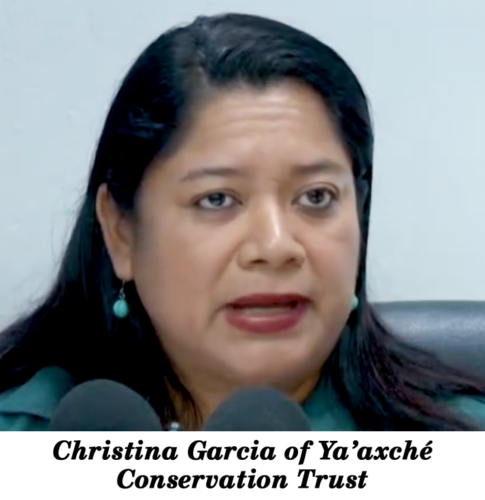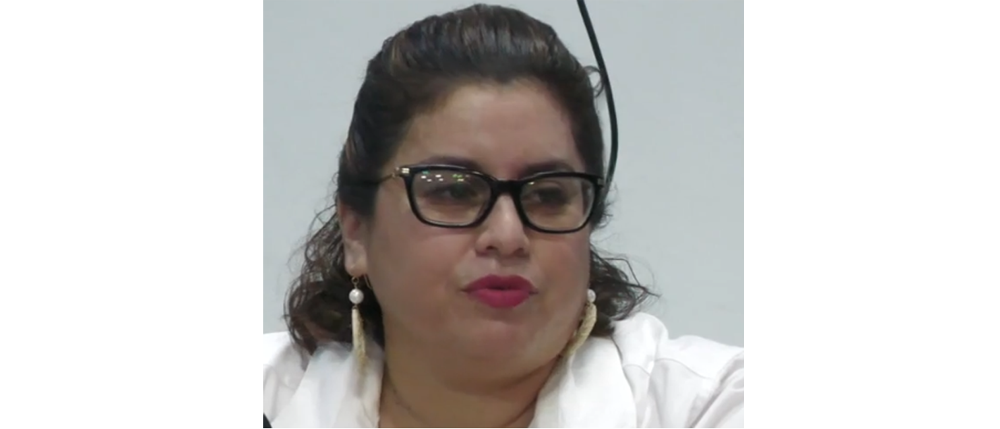Photo: Amanda Acosta, APAMO Chairlady
The Association of Protected Areas Management Organizations (APAMO) says the Government of Belize is micromanaging them; they demand meaningful consultation.
by Charles Gladden
BELIZE CITY, Thurs. July 18, 2024
The Association of Protected Areas Management Organizations (APAMO) invited the local media to a press conference at the Marion Jones Sports Complex on Thursday, July 18, where they expressed their discontentment with the Government of Belize’s (GoB) style of micromanagement.
APAMO is a non-governmental or community-based organization consisting of 16 of 21 members of the NGO community that are legally recognized as managers of protected areas, whether terrestrial or marine.
According to APAMO, two pieces of legislation were presented earlier this year by the Ministry of Sustainable Development and Climate Change and given the short notice to attend consultation sessions, they were unable to attend. The National Protected Area System Act (NPAS) was highlighted at the press conference, and APAMO believes the ministry is changing the dynamics of how they operate.
Two letters have been sent to the GoB regarding the pieces of legislation (which will be further explained) in May and June of this year, and APAMO has yet to receive any response, thus they are publicly expressing their frustration.
“We also wanted to reiterate that it has been a long-standing situation where we feel that the government has taken a top-down approach, where the legislation is drafted and then it is brought to us,” said APAMO Chairlady, Amanda Acosta.
Acosta said that APAMO, apart from the many people in its membership, contributes 16 million dollars annually to protected areas. “When we compare it to the government’s contribution specifically to protected areas, it is significant. We are solely focused on protected areas, and this money goes into that. If I add in the full composite of the 21 NGOs, you are talking 21 million dollars coming into this, or that is going into protected areas across the country. I say all of this to set the table, to set the context, that we are partners in the co-management of protected areas. A top-down approach [will not] work because we are contributing more than our share towards this system,” Acosta said.
The Protected Areas Conservation Trust (Amendment) Bill 2024 was first introduced in 2015, and the amendment bill is a revised edition to clean up the issues it originally had. However, GoB is trying to add a 40% administrative fee on what the NGOs make through different initiatives.
“That is not acceptable in the international setting. We feel that that will cause some concern to those who are looking from the outside in at PACT and how it operates, and we do not feel this is an acceptable number. 15 to 20 percent admin in any institution is about the norm; and so, we are saying that that is what we recommend that they maintain their operations within,” Acosta says.

About the National Protected Areas System (NPAS), as mentioned above, Christina Garcia of Ya’axché Conservation Trust said that it creates a redundancy, as two or more entities are responsible for the management of the protected areas.
“Similarly, the NPAS bill also contemplates that these are the issues of capacity building, and resources are the responsibility of the ministry. But, certain parts of the act also allude to that responsibility being in the hands of the Forest Department and the National Biodiversity Office. So, who is it that we should report to? Who we should be working with? And we feel like that needs to be corrected within the National Protected Areas System Act,” Garcia mentioned. “I have been in conservation for the past 20 years, and usually legislations are developed and then there’s no consultations that happen, no meaningful consultations that have happened. We have been managing these protected areas for many years. In the case of Ya’axché, we have been there for 25 years. So, I think that by 25 years you have an idea of how management works, an idea of what needs to change, recommendations given, and I think at this point we have not had that meaningful conversation with the government,” she said.
Acosta mentioned that a 7-page letter was sent to GoB highlighting their concerns about both legislations. But, the concerns went on deaf ears – a classic move by this administration – as GoB has not responded or acknowledged receiving their letter.
“We feel that they are attempting to change the way we operate. Change is not necessarily bad, but change involves both parties being involved, coming to a compromise, and understanding the impacts of the decision … the fact that the protected areas are also, or are part of the tourism product within this country. What are the implications? And what is the ripple effect to the tourism product if you are getting to the point of micromanagement, wanting to know what time we will open? And do we have to report those things? It gives a strong authoritarian feeling. That is not, again, the norm,” she highlights.
Acosta notes that APAMO wants to be consulted and involved in the decision-making and has made its move. The heat is on for GoB, but it seems as if they’re not budging. In an interview with Minister of Sustainable Development, Climate Change & Disaster Risk, Hon. Orlando Habet, he said that they can’t be giving out money without any accountability. “What we’re trying to do is to have a conservation investment component of PACT, so that you can also afford the NGOs, the co-managers, to be able to get grants – a portion – and be able to account back to PACT on how that was used. So, the investment portion is now looking at how you can leverage whatever we give you to get back more money from other agencies, whether local or international, to build on your project, to build on your co-management, and improve the protective areas that you are co-managing. But you will always have people who have already been accustomed to a form of doing things and not moving forward,” he said.

